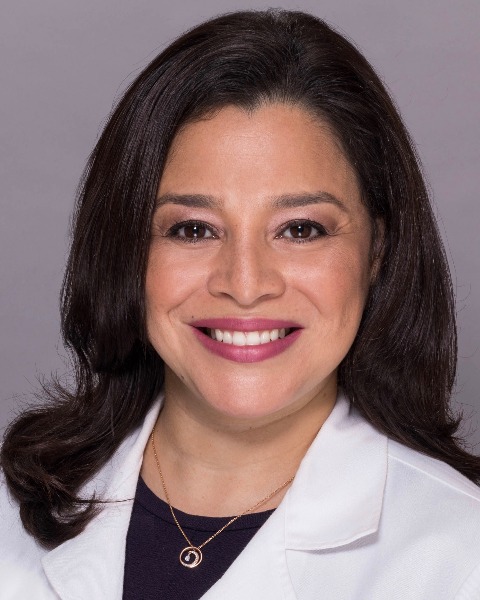Back


Clinical Posters
JL1029C: Strategies for Optimization and Growth of an Oncology Symptom Management Advanced Practice Provider–Driven Clinic
Saturday, October 22, 2022
10:00 AM – 11:00 AM ET

Has Audio

Maritza Alencar, DNP, MBA, APRN-BC, BMTCN, FAANP
Executive Director, Clinical Operations
University of Miami Sylvester Comprehensive Cancer Center
Miami Beach, Florida, United States
Poster Presenter(s)
BACKGROUND
Oncological treatments continue to evolve and improve outcomes of cancer patients. It is critical that cancer centers have specialized teams that provide early access to urgent management of toxicities and complications outside of the Emergency Department (ED). The Oncology CARE Clinic (OCC), a non-emergent symptom management Advanced Practice Provider-driven clinic, was originally introduced in May 2019.
METHODS
Single-center analysis of cancer patients who received care in the symptom management clinic with focus on how to optimize most common services rendered. Open discussions with providers were conducted via faculty meetings to determine barriers to OCC. Press Ganey® surveys were reviewed to capture voice of the customer. The ED and oncology team collaborated to develop clinical pathways and establish criteria for triage nurses and providers on appropriate patients to be sent to OCC.
RESULTS
Four areas of opportunities were identified; (1) lack of awareness of location, hours of operation, and services available; (2) services offered did not meet demand; (3) limiting walk ins prevented patients from receiving needed care; (4) and lack of communication between OCC and referring providers. From July 2021 to December 2021, OCC saw 235 encounters with a daily average of 3 patients. Starting in December 2022, OCC underwent expansion of services allowing walk-ins, urgent peripherally inserted central catheter (PICC) removals, COVID positive patient supportive care or continuation of cancer treatment, and coordination of direct admissions. Marketing efforts were leveraged by implementing a website and additional signage to raise awareness and provide guidance for patients and providers. Communication was also strengthened by the creation of a Secure Chat via electronic medical record (EMR). These changes led to a 142% increase in daily average to 5 patients with a total of 571 encounters between January and June 2022.
CONCLUSIONS
Identification of deficiencies and successful implementation of solutions led to significant expansion of access for cancer patients to early interventions of urgent symptomatic issues. Of importance, these initiatives highlight the capacity for APP-driven clinics to have a significant impact on cancer care and improving patient outcomes.
RECOMMENDATIONS
OCC continues to look for opportunities to expand services. Developing a relationship with all hospital stakeholders to identify patients appropriate for the symptom management clinic can be a beneficial resource for optimization. It is also important to leverage patient surveys to understand where lies opportunities and reevaluate need for changes.
INNOVATION
Multidisciplinary approach and collaborations between oncology and non-oncology stakeholders was imperative to address opportunities for OCC. Clinical pathways, marketing efforts and implementation of innovative tools such as Secure Chat via EMR led to successful growth and improved access to urgent supportive care.
Oncological treatments continue to evolve and improve outcomes of cancer patients. It is critical that cancer centers have specialized teams that provide early access to urgent management of toxicities and complications outside of the Emergency Department (ED). The Oncology CARE Clinic (OCC), a non-emergent symptom management Advanced Practice Provider-driven clinic, was originally introduced in May 2019.
METHODS
Single-center analysis of cancer patients who received care in the symptom management clinic with focus on how to optimize most common services rendered. Open discussions with providers were conducted via faculty meetings to determine barriers to OCC. Press Ganey® surveys were reviewed to capture voice of the customer. The ED and oncology team collaborated to develop clinical pathways and establish criteria for triage nurses and providers on appropriate patients to be sent to OCC.
RESULTS
Four areas of opportunities were identified; (1) lack of awareness of location, hours of operation, and services available; (2) services offered did not meet demand; (3) limiting walk ins prevented patients from receiving needed care; (4) and lack of communication between OCC and referring providers. From July 2021 to December 2021, OCC saw 235 encounters with a daily average of 3 patients. Starting in December 2022, OCC underwent expansion of services allowing walk-ins, urgent peripherally inserted central catheter (PICC) removals, COVID positive patient supportive care or continuation of cancer treatment, and coordination of direct admissions. Marketing efforts were leveraged by implementing a website and additional signage to raise awareness and provide guidance for patients and providers. Communication was also strengthened by the creation of a Secure Chat via electronic medical record (EMR). These changes led to a 142% increase in daily average to 5 patients with a total of 571 encounters between January and June 2022.
CONCLUSIONS
Identification of deficiencies and successful implementation of solutions led to significant expansion of access for cancer patients to early interventions of urgent symptomatic issues. Of importance, these initiatives highlight the capacity for APP-driven clinics to have a significant impact on cancer care and improving patient outcomes.
RECOMMENDATIONS
OCC continues to look for opportunities to expand services. Developing a relationship with all hospital stakeholders to identify patients appropriate for the symptom management clinic can be a beneficial resource for optimization. It is also important to leverage patient surveys to understand where lies opportunities and reevaluate need for changes.
INNOVATION
Multidisciplinary approach and collaborations between oncology and non-oncology stakeholders was imperative to address opportunities for OCC. Clinical pathways, marketing efforts and implementation of innovative tools such as Secure Chat via EMR led to successful growth and improved access to urgent supportive care.

